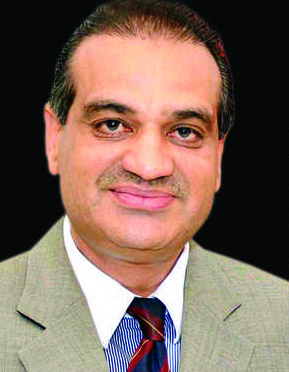Landmark ECO Summit By Ansar Mahmood Bhatti

The Economic Cooperation Organisation (ECO) Summit in Islamabad on March 01 was indeed a significant event particularly from Pakistan’s stand point because despite some forces that tried to sabotage and create instability within the country, the summit was indeed held and generally met its objectives. Tremendous credit must go to the countries whose heads of state and government came to attend the summit despite the volatile situation in our country after a spate of terrorist attacks that took scores of precious lives. Likewise, kudos to our government and our foreign policy bosses for successful holding of the summit, even if it implied having a fortress defence for the capital, Islamabad. Of course much more needs to be done to facilitate and host similar summits in order to promote a peaceful image of Pakistan both at home and abroad.
Economic Cooperation Organization (ECO) is an intergovernmental regional organization established in 1985 by Iran, Pakistan and Turkey for the purpose of promoting economic, technical and cultural cooperation among the Member States. ECO is the successor organization of Regional Cooperation for Development (RCD) which remained in existence from 1964 to 1979.
In 1992, the Organization was expanded to include seven new members, Afghanistan, Azerbaijan, Kazakhstan, Kyrgyz Republic, Tajikistan, Turkmenistan and Uzbekistan. The date of the Organization’s expansion to its present strength, 28th November, is being observed as the ECO Day. It would be worthwhile for further strengthening the Organization that ECO Day is celebrated in every member state with greater enthusiasm, fervor and festivity in order to foster better relations, cohesion and coordination among the member states.
The ECO charter lays down that the member countries shall work hand in hand to achieve goals of progressive removal of trade barriers and promotion of intra- regional trade; greater role of ECO region in the growth of world trade; gradual integration of the economies of the Member States with the world economy; development of transport & communications infrastructure linking the Member States with each other and with the outside world. Nevertheless, the Organization is yet to take on many of these challenges for a variety of reasons – instability in Afghanistan being at the top since Afghanistan provides a key link when it comes to transit trade activities, as rightly pointed out by President of Tajikistan Emomali Rahmon in his speech.
Regretfully, Afghanistan refused to send high level representation at the summit in Islamabad as tensions between the two countries over terror sanctuaries remain unresolved. Afghanistan’s absence from the summit could have some disturbing impact on the objectives of the ECO. However, despite the perception that peace in Afghanistan is the sine qua non for the development and strengthening of the ECO, CPEC (China Pakistan Economic Corridor) will be a good alternative till stability returns to Afghanistan.
Then, Iran’s estranged relations with the Western world are yet another factor that has impeded speedy growth of the Organisation. One of the key goals of ECO is cooperation in the energy sector. Regretfully, the Pakistan, Iran gas pipeline project is still in limbo owing to Western opposition to the project and partly because Iran is still under embargoes. Pakistan is very apprehensive that if it goes ahead with this project, it will face the ire of anti Iran international community. Pakistan’s former President Asif Zardari, during the last days of his tenure had flown to Iran to inaugurate the gas pipeline project together with the Iranian President. It was well known then that Mr. Zardari is only playing politics and there will be little outcome after the staged inauguration.
Asif Zardari’s visit to Iran was based on two reasons. Firstly, he wanted to convey to the Iranians that he and his party were very ardent about the early completion of this project implicitly implying that certain forces in Pakistan did not want this project to happen. Secondly, he wanted to use this inauguration for political reasons. Although, he was well aware that even for his successors it would be nigh impossible to make any further progress on the project because of external and internal complications, yet he chose to inaugurate the project – obviously for political gains.
This is where regional organizations such as the ECO can play a vital role. There is not an iota of doubt that the planned Iran-Pakistan gas pipeline project, if realized, will adequately meet our energy needs and more so on cheaper rates. Ostensibly this appears a daunting task because of possible international pressures, nonetheless ECO as an entity needs to take a bold stand on this issue – and Iran and Pakistan must also explore all possible avenues to make it happen.
ECO could be more relevant and efficient by introducing a visa regime among the 10 member states on the pattern of Schengen visa system that enables the visa holders to visit 26 European countries. The encouraging aspect of this system is that visitors can visit even those countries that are not members of European Union such as Norway and Switzerland. A similar visa system would surely add to the credentials of ECO allowing their nationals to visit member states for trade and tourism etc., through a less cumbersome process.
Even for SAARC, a visa on the pattern of Schengen visa regime will do wonders for the member states when intra-state movement of people is more convenient. Unfortunately, in case of SAARC hostility between Pakistan and India is the key stumbling block for any worthwhile benefit or progress of this regional alliance. On the contrary, in the case of ECO there is no such handicap.
While the Islamabad Declaration underscores the significance of more connectivity and cooperation, the aspect of increasing the membership, scope and activities of ECO Trade and Development Bank that will serve as an EXIM Bank for the member states could truly be a good landmark decision, if implemented.
Related News

Innovative diplomacy with the US, KSA and Iran
By: Qamar Bashir The convergence of diplomatic engagements between Pakistan, USA, Kingdom of Saudi ArabiaRead More

Is there any hope at the end of the tunnel?
When contemplating the future of Chinese and other countries’ investments and involvement in Pakistan, aRead More


Comments are Closed